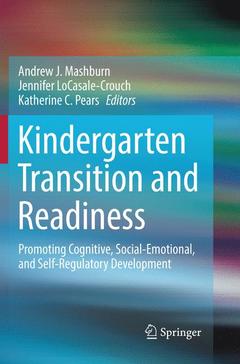Description
Kindergarten Transition and Readiness , Softcover reprint of the original 1st ed. 2018
Promoting Cognitive, Social-Emotional, and Self-Regulatory Development
Coordinators: Mashburn Andrew J., LoCasale-Crouch Jennifer, Pears Katherine C.
Language: English
Subjects for Kindergarten Transition and Readiness :
Keywords
Alignment between Head Start and kindergarten; Cognitive development in early childhood; Dual language learners in kindergarten; English language learners in kindergarten; Early adversity in kindergarten; Early childhood development; Early childhood education; Early childhood special education; Evidence-based interventions for promoting school readiness; Evidence-based practices for promoting school readiness; Head Start; preschool; and transition to kindergarten; Pre-K and school readiness; School readines
Publication date: 12-2018
Support: Print on demand
Publication date: 06-2018
Support: Print on demand
Description
/li>Contents
/li>Biography
/li>Comment
/li>
- Consistency in children?s classroom experiences and implications for early childhood development.
- Changes in school readiness in U.S. kindergarteners.
- Effective transitions to kindergarten for low-income children.
- The transition into kindergarten for English language learners.
- The role of close teacher-child relationships during the transition into kindergarten.
- Children?s temperament and its effect on their kindergarten transitions.
Andrew J. Mashburn, Ph.D., is a Professor of Developmental Psychology at Portland State University. His research focuses on identifying, developing, and testing innovative approaches to promote school readiness and later school success for children living in poverty. He has been involved in large-scale studies of the effects of preschool programs and strategies to improve preschool quality and/or children’s development.
Jennifer LoCasale-Crouch, Ph.D., is a Research Assistant Professor at the University of Virginia's Center for Advanced Study of Teaching and Learning (CASTL). Her research focuses on the supports and systems that influence children during their early school experiences, and how we can best enhance those experiences to support children’s development. She has extensive experience in the design and implementation of studies in early childhood settings across varying cultural and geographic contexts.
Katherine C. Pears, Ph.D., is a Senior Scientist at the Oregon Social Learning Center in Eugene, OR. Her research focuses on factors influencing school readiness and school adjustment in children facing early adversity such as placement in foster care due to maltreatment and poverty. She has designed, tested, and implemented preventive interventions for high-risk children to prepare them and their caregivers for the kindergarten transition.
Provides intervention strategies for improving children’s transitions to kindergarten
Examines young children’s cognitive, social-emotional, and self-regulatory development
Discusses school readiness of children with disabilities, children who experience early adversity, and ELLs
Presents a conceptual framework for understanding and supporting children entering into kindergarten
Describes children’s experiences across Head Start, preschool, and kindergarten classrooms




